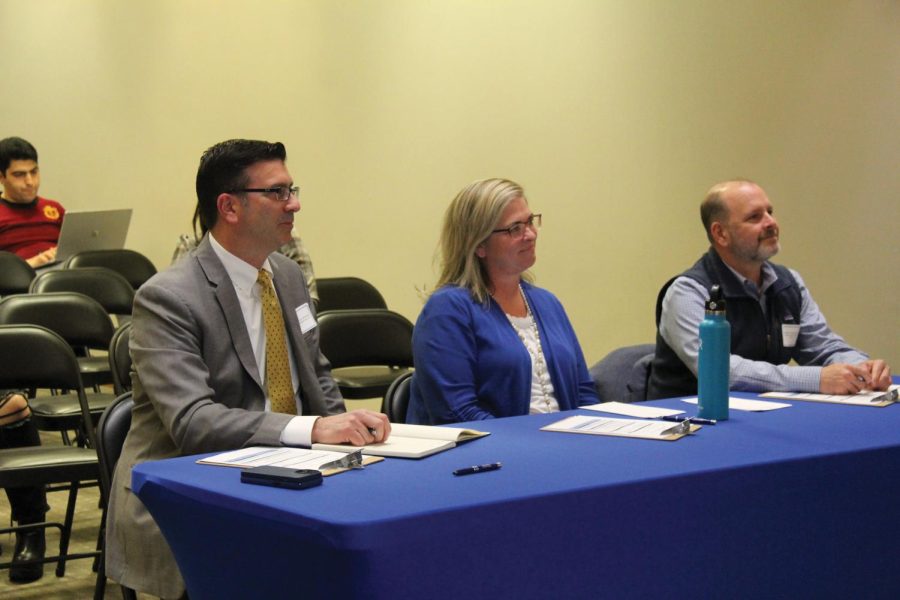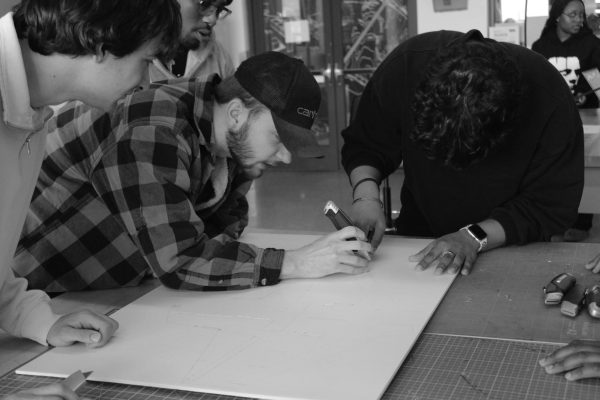Smerd Pitch provides opportunities for student entrepreneurs
Photo courtesy of Charger Bulletin/Amber Cholewa.
Longobardi (left), Perry (center) and Scott (right) look toward Smerd Pitch contestants, West Haven, Nov. 10, 2022.
Five teams of student entrepreneurs gathered in the Atrium of the university’s Orange Campus this past Thursday after five weeks of preparing for the opportunity to pitch their startup business ideas to a panel of judges.
The event was organized by the university’s Entrepreneurship Club and was sponsored by Peter Smerd, a member of the Pompea College of Business’ Advisory Board and President of Boulevard Building, Inc.
The executive board for the Entrepreneurship Club was introduced, which included President Amaya Guzman, Vice President Matt Cordell, Executive Assistant Jaliyah Monte, Public Relations Chair Krystal Colquhoun and Treasurer Thomas Hart.
The advisor, Vasiliki Kosmidou, was also recognized for her accomplishments at the prior day’s ceremony.
The first team was Zutopa, run by students Rupesh Lankipalli and Harshavardhan Reddy Balla. Their mission surrounds aiding in finding housing for international students before they even reach the United States.
The duo indicated that their priorities honed in on affordability and convenience. They also claimed that they are the first to market end-to-end booking which will occur before reaching the destination.
According to a survey conducted by the founders of Zutopa, approximately 75% of international students indicated a desire to secure housing before reaching the United States.
Zutopa outlined their marketing strategy, which implemented a bullseye framework of partnerships, social media and events. They also discussed their business projections, in which they make 10% commission on monthly rental transactions and offer subscriptions to productive services.
They explained their process of creating relationships with campuses in the United States–though their target radius is focusing on the state of Connecticut upon launch–and with students overseas.
They told the judges and those in the audience that their company name was in fact inspired by the animated movie “Zootopia,” and that they wanted to highlight the motifs of being an underdog taking to a global stage.
Next to the podium was Fitbox, founded by Vamshi Krishna Adam and Nilesh Chilka, who was not present.
The proposal surrounded an artificial intelligence wellness trainer that exhibited habit-forming technology. Their presentation said, “We aim to level up the home fitness revolution with the help of our handy gadget to the mainstream audience all around the world.”
The product contained both a physical system and an online app.
They showed a demo of the app, which applied motion sensors and stored history of activity. Adam voiced that he had a gaming background which he applied to the strategic design of the application.
The third business was Party Buff, founded independently by Rishav Kant.
Promoting “party with style,” and saying he sought to approach the problem of expectation versus reality with products, Kant described a website that had access to a wide supply of party products all in one place.
He promoted an easy-to-use interface and said that “even a seven year old can use the website.”
His site also showcased an AI software that allows users to visualize what decor would look like in their space. In explaining the benefits, Kant said that “looking at decor before buying it is game-changing.”
His value proposition promoted a hassle-free solution and one-stop destination for customer needs.
Kant announced that since the company launched in 2020 in India, Party Buff has over 12,000 active followers on Instagram and a rating of 4.9/5 on Google.
Onthego! was founded by student Adan Dowsett, seeking to resolve problems surrounding students’ struggle to get a job, the nature of their busy schedules and the ways in which they miss out on meals.
Dowsett’s proposition surrounded providing students with the opportunity to work using a mobile app to deliver on-campus food options to other students, so that they “never miss a meal again.”
He said his competitive advantage surrounded the safety of knowing students are trusted from the university, since platforms like Uber Eats and Doordash are external. Additionally, since Onthego! uses meal plan content, no actual money has to be spent by students. Dowsett reinforced the student employment opportunities as well.
Devesh Patel was the founder of Tranzitor, which was the final pitch of the night.
This company focused their content on the manufacturing chain of events, with problems outlining rising fuel prices and shrinking profit margins.
In such a cost-driven industry, Patel proposed a model for switching oil diesel to electric power trains. He displayed this model to the panel and those in attendance.
He said that the company would use Smerd Pitch funds for pilot testing, then establish a facility, as well as proper certification.
The three judges, all of whom were alumni, took a brief pause to deliberate before the room gathered back to announce the winners. The judges panel for the evening included Gerald Longobardi, an adjunct professor at the Pompea College of Business and CEO of The Longobardi Group, Marybeth Perry, an entrepreneur and Jamison Scott, executive director of ManufactureCT.
The award for the voted-in crowd favorite was Party Buff.
Second place, earning $4,000 to apply to the business, was Onthego!
First place, earning $6,000 to fund their endeavors, was Zutopa.

Mia Adduci is a senior studying communication concentrating in multi-platform journalism and media who began writing for the paper her first semester on...











